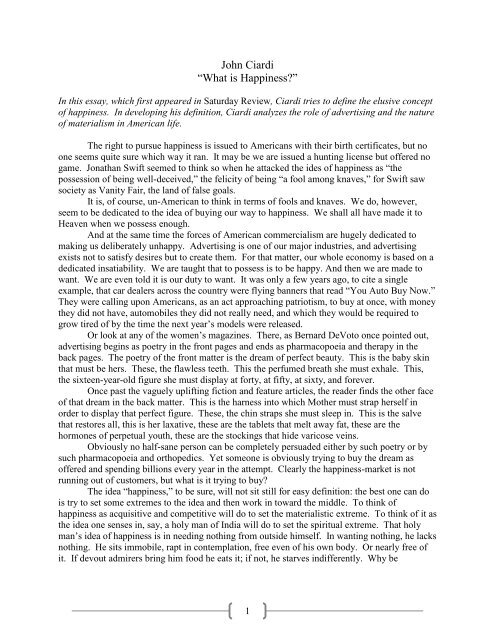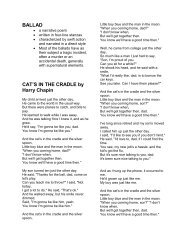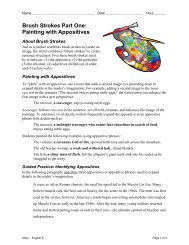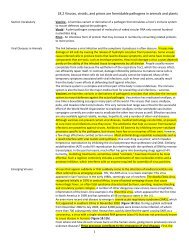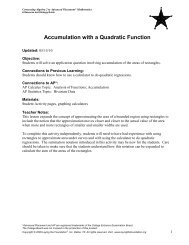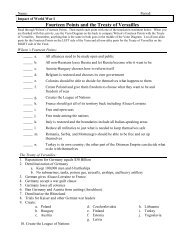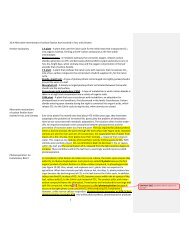“What is Happiness?”1 John Ciardi - Moore Public Schools
“What is Happiness?”1 John Ciardi - Moore Public Schools
“What is Happiness?”1 John Ciardi - Moore Public Schools
Create successful ePaper yourself
Turn your PDF publications into a flip-book with our unique Google optimized e-Paper software.
<strong>John</strong> <strong>Ciardi</strong><br />
<strong>“What</strong> <strong>is</strong> <strong>Happiness</strong>?”<br />
In th<strong>is</strong> essay, which first appeared in Saturday Review, <strong>Ciardi</strong> tries to define the elusive concept<br />
of happiness. In developing h<strong>is</strong> definition, <strong>Ciardi</strong> analyzes the role of advert<strong>is</strong>ing and the nature<br />
of material<strong>is</strong>m in American life.<br />
The right to pursue happiness <strong>is</strong> <strong>is</strong>sued to Americans with their birth certificates, but no<br />
one seems quite sure which way it ran. It may be we are <strong>is</strong>sued a hunting license but offered no<br />
game. Jonathan Swift seemed to think so when he attacked the ides of happiness as “the<br />
possession of being well-deceived,” the felicity of being “a fool among knaves,” for Swift saw<br />
society as Vanity Fair, the land of false goals.<br />
It <strong>is</strong>, of course, un-American to think in terms of fools and knaves. We do, however,<br />
seem to be dedicated to the idea of buying our way to happiness. We shall all have made it to<br />
Heaven when we possess enough.<br />
And at the same time the forces of American commercial<strong>is</strong>m are hugely dedicated to<br />
making us deliberately unhappy. Advert<strong>is</strong>ing <strong>is</strong> one of our major industries, and advert<strong>is</strong>ing<br />
ex<strong>is</strong>ts not to sat<strong>is</strong>fy desires but to create them. For that matter, our whole economy <strong>is</strong> based on a<br />
dedicated insatiability. We are taught that to possess <strong>is</strong> to be happy. And then we are made to<br />
want. We are even told it <strong>is</strong> our duty to want. It was only a few years ago, to cite a single<br />
example, that car dealers across the country were flying banners that read “You Auto Buy Now.”<br />
They were calling upon Americans, as an act approaching patriot<strong>is</strong>m, to buy at once, with money<br />
they did not have, automobiles they did not really need, and which they would be required to<br />
grow tired of by the time the next year’s models were released.<br />
Or look at any of the women’s magazines. There, as Bernard DeVoto once pointed out,<br />
advert<strong>is</strong>ing begins as poetry in the front pages and ends as pharmacopoeia and therapy in the<br />
back pages. The poetry of the front matter <strong>is</strong> the dream of perfect beauty. Th<strong>is</strong> <strong>is</strong> the baby skin<br />
that must be hers. These, the flawless teeth. Th<strong>is</strong> the perfumed breath she must exhale. Th<strong>is</strong>,<br />
the sixteen-year-old figure she must d<strong>is</strong>play at forty, at fifty, at sixty, and forever.<br />
Once past the vaguely uplifting fiction and feature articles, the reader finds the other face<br />
of that dream in the back matter. Th<strong>is</strong> <strong>is</strong> the harness into which Mother must strap herself in<br />
order to d<strong>is</strong>play that perfect figure. These, the chin straps she must sleep in. Th<strong>is</strong> <strong>is</strong> the salve<br />
that restores all, th<strong>is</strong> <strong>is</strong> her laxative, these are the tablets that melt away fat, these are the<br />
hormones of perpetual youth, these are the stockings that hide varicose veins.<br />
Obviously no half-sane person can be completely persuaded either by such poetry or by<br />
such pharmacopoeia and orthopedics. Yet someone <strong>is</strong> obviously trying to buy the dream as<br />
offered and spending billions every year in the attempt. Clearly the happiness-market <strong>is</strong> not<br />
running out of customers, but what <strong>is</strong> it trying to buy?<br />
The idea “happiness,” to be sure, will not sit still for easy definition: the best one can do<br />
<strong>is</strong> try to set some extremes to the idea and then work in toward the middle. To think of<br />
happiness as acqu<strong>is</strong>itive and competitive will do to set the material<strong>is</strong>tic extreme. To think of it as<br />
the idea one senses in, say, a holy man of India will do to set the spiritual extreme. That holy<br />
man’s idea of happiness <strong>is</strong> in needing nothing from outside himself. In wanting nothing, he lacks<br />
nothing. He sits immobile, rapt in contemplation, free even of h<strong>is</strong> own body. Or nearly free of<br />
it. If devout admirers bring him food he eats it; if not, he starves indifferently. Why be<br />
1
concerned? What <strong>is</strong> physical <strong>is</strong> an illusion to him. Contemplation <strong>is</strong> h<strong>is</strong> joy and he achieves it<br />
through a fantastically demanding d<strong>is</strong>cipline, the accompl<strong>is</strong>hment of which <strong>is</strong> a joy within him.<br />
Is he a happy man? Perhaps h<strong>is</strong> happiness <strong>is</strong> only another sort of illusion. But who can<br />
take it from him? And who will dare say it <strong>is</strong> more illusory than happiness on the installment<br />
plan?<br />
But, perhaps because I am Western, I doubt such catatonic happiness, as I doubt the<br />
dreams of the happiness-market. What <strong>is</strong> certain <strong>is</strong> that th<strong>is</strong> way of happiness would be torture to<br />
almost any Western man. Yet these extremes will still serve to frame the area within which all<br />
of us must find some sort of balance. Thoreau – a creature of both Eastern and Western thought<br />
– had h<strong>is</strong> own firm sense of that balance. H<strong>is</strong> aim was to save on the low levels in order to spend<br />
on the high. Possession for its own sake or in competition with the rest of the neighborhood<br />
would have been Thoreau’s idea of the low levels. The active d<strong>is</strong>cipline of heightening one’s<br />
perceptions of what <strong>is</strong> enduring in nature would have been h<strong>is</strong> idea of the high. What he saved<br />
from the low was time and effort he could spend on the high. Thoreau certainly d<strong>is</strong>approved of<br />
starvation, but he would put into feeding himself only as much effort as would keep him function<br />
for more important efforts.<br />
Effort <strong>is</strong> the g<strong>is</strong>t of it. There <strong>is</strong> no happiness except as we take on life-engaging<br />
difficulties. Short of the impossible, as Yeats put it, the sat<strong>is</strong>factions we get from a lifetime<br />
depend on how high we choose our difficulties. Robert Frost was thinking in something like the<br />
same terms when he spoke of “The pleasure of taking pains.” The mortal flaw in the advert<strong>is</strong>ed<br />
version of happiness <strong>is</strong> that it purports to be effortless.<br />
We demand difficulty even in our games. We demand it because without difficulty there<br />
can be no game. A game <strong>is</strong> a way of making something hard for the fun of it. The rules of the<br />
game are an arbitrary imposition of difficulty. When the spoilsport ruins the fun, he always does<br />
so by refusing to play by the rules. It <strong>is</strong> easier to win at chess if you are free, at your pleasure, to<br />
change the wholly arbitrary rules, but the fun <strong>is</strong> winning within the rules. No difficulty, no fun.<br />
The buyers and sellers of the happiness-market seem too often to have lost their sense of<br />
the pleasure of difficulty. Heaven knows what they are playing, but it seems a dull game. And<br />
the Indian holy man seems dull to us, I suppose, because he seems to be refusing to play<br />
anything at all. The Western weakness may be an illusion that happiness can be bought.<br />
Perhaps the Eastern weakness <strong>is</strong> in the idea that there <strong>is</strong> such a thing as perfect (and therefore<br />
static) happiness.<br />
<strong>Happiness</strong> <strong>is</strong> never more than partial. There are no pure states of mankind. Whatever<br />
else happiness may be, it <strong>is</strong> neither in having nor in being, but in becoming. What the Founding<br />
Fathers declared for us as an inherent right, we should do well to remember, was not happiness<br />
but the pursuit of happiness. What they might have underlined, could they have foreseen the<br />
happiness-market, <strong>is</strong> the cardinal fact that happiness <strong>is</strong> in the pursuit itself, in the meaningful<br />
pursuit of what <strong>is</strong> life-engaging and life-revealing, which <strong>is</strong> to say, in the idea of becoming. A<br />
nation <strong>is</strong> not measured by what it possesses or wants to possess, but by what it wants to become.<br />
By all means let the happiness market sell us minor sat<strong>is</strong>factions and even minor follies<br />
so long as we keep them in scale and buy them out of spiritual change. I am no customer for<br />
either Puritan<strong>is</strong>m or ascetic<strong>is</strong>m. But drop any real spiritual capital at those bazaars, and what you<br />
come home to will be your own poorhouse.<br />
2


